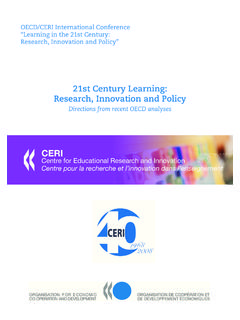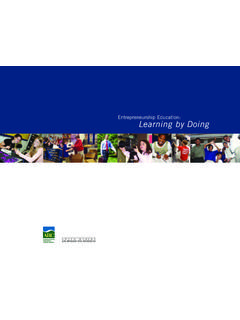Transcription of LEADERSHIP IN A RAPIDLY CHANGING WORLD - PRME
1 LEADERSHIP IN A RAPIDLY CHANGING WORLDHow business leaders are reframing successMarch 2012 Produced on behalf of the United Nations Global Compact and Principles for Responsible Management Education for the Rio+20 Conference on Sustainable Development Lead Authors:Mathew Gitsham, Director, Centre for Business and Sustainability, AshridgeJo Wackrill, LEADERSHIP Agenda Project Director, IBLFS upporting Authors:Graham Baxter, Senior Advisor, IBLFMark Pegg, Director, Ashridge LEADERSHIP Centre Ashridge & IBLFAll rights reserved. Except for the quotation of short passages for the purposes of criticism or review, no part of this publication may be reproduced, stored in a retrieval system, or transmitted, in any form or by any means, electronic, mechanical, photocopying, recording or otherwise, without the prior permission of Ashridge and 978-0-903542-85-2 CONTENTS1 EXECUTIVE SUMMARY4 INTRODUCTION7 LEADERSHIP IN A RAPIDLY CHANGING WORLD7 A different perspective: reframing the business leader s role and purpose12 LEADERSHIP ROLES OLD AND NEW12 A familiar LEADERSHIP role: leading change and innovation across the business17 A new LEADERSHIP role.
2 Leading change beyond business boundaries22 HOW CAN THIS TREND BE ACCELERATED?27 IMPLICATIONS FOR THINKING ABOUT BUSINESS LEADERSHIP28 CONCLUSIONS28 NEXT STEPS29 POST-SCRIPT: HOW IS BUSINESS LEADERSHIP BEING REFRAMED?1In November 2010, to big fanfare at Unilever s London headquarters, chief executive Paul Polman boldly articulated a new strategy. The WORLD s third biggest consumer goods company would double the size of its business, he said, by channelling its efforts toward achieving eight ambitious goals by 2020: helping more than a billion people improve their hygiene habits bringing safe drinking water to 500 million people doubling the proportion of Unilever s portfolio that meets the highest nutritional standards halving the greenhouse gas impact of its products across the lifecycle halving the water associated with the consumer use of its products halving the waste associated with the disposal of its products sourcing 100% of its agricultural raw materials sustainably linking 500,000 smallholder farmers and small-scale distributors into its supply chainThis may not sound like a typical corporate strategy.
3 But Polman s reframing of what it means to succeed as a business leader is not an isolated example. It is indicative of a new generation of leaders emerging across a number of the WORLD s largest stereotypes of business leaders abound in public debate in the wake of the financial crisis. In heated discussion on reforming capitalism, there is some emerging consensus that the roots of the current crisis in North America and Europe lie in an excessive focus on short-term return on equity in the dominant economic model of the past 20-30 years1. But at the same time, in response to the emerging challenges of the past decade, we have already begun to see growing numbers of top executives talking about, taking action on and defining their success in terms of things that have conventionally been the realm of political leaders and NGO activists business growth that is smart, inclusive and coming to terms with how to satisfy shifting market demand for an improved quality of life and greater inclusion in an increasingly resource-constrained context, business leaders have been forced to chart a new path.
4 They have begun to rethink and redefine how they create long term value, and adopt measures of success that go beyond just short-term shareholder value to embrace a much broader range of indicators of stakeholder value . This change has not gone unremarked by management s leading thinkers. Witness Chris Lazslo s work on sustainable value, and Porter and Kramer s theorizing about shared value2. Increasingly these concerns and concepts are being reflected in the language of the Chairs and CEOs of some of the WORLD s largest global companies think Anglo American s Cynthia Carrol, GSK s Andrew Witty, Wal-Mart s Lee Scott, GE s Jeff Immelt, Nestle s Paul Bulcke, Petrobras Jos Gabrielli, the list goes does this shift mean for the practice of business LEADERSHIP ?
5 Dominant ideas about what defines effective business LEADERSHIP constantly evolve in response to political events, economic policies, CHANGING business strategies and cultural and societal pioneers do today often becomes mainstream tomorrow. So what can we conclude about the future of business LEADERSHIP by looking at what has already begun to emerge in current and recent practice?We have been exploring this question by engaging with business leaders, including some who have sat at the top of the WORLD s largest and most global companies. We asked them to reflect on how their approach to leading has needed to be different to the generation that preceded them.
6 And with a view to understanding how this trend might be accelerated, we have also been exploring what has provoked the shifts in their own thinking and different perspective: reframing the business leader s role and purposeFrom these conversations, a consistent theme has emerged: a growing number of today s global business leaders have needed to adopt a different perspective on their role and purpose. EXECUTIVE SUMMARY1 Meyer, C. and Kirby, J. (2012) Runaway Capitalism Harvard Business Review, Jan-Feb 20122 Laszlo, C. (2008) Sustainable Value: how the WORLD s leading companies are doing well by doing good. Stanford. Porter, M. E., & Kramer, M.
7 R. (2011) Creating Shared Value. Harvard Business Review, 89(1/2), generation ago, the prevailing attitude was that it was the role of political leaders to address the big societal issues of the day, not business leaders. Some engaged in philanthropic activities, either as individuals or through company contributions. But most would have argued such concerns would only be a distraction from their core role and a source of cost. Fast forward to today s business leaders and you hear a very different attitude being expressed: that it is essential for senior executives to have a nuanced understanding of the major societal forces shaping our WORLD , and to know where and how to respond through the way they go about their core business, in a way that benefits their business and wider society.
8 A sizeable cohort of business leaders now evidently believes that playing a LEADERSHIP role in understanding and addressing the major forces shaping society far from being a source of cost is now central to how they create roles old and newThe other consistent theme to emerge from the research is that to act on this new perspective requires a certain set of LEADERSHIP practices, many of which are familiar, but some of which are new, and all of which require skill to do well. A familiar LEADERSHIP role: leading change and innovation across the businessAll our interviewees spoke about the kinds of activities that are now commonly accepted as vital (which is not to say easy) when leading any kind of change and innovation: seeing the connection between external trends and the implications for core business, creating the conditions to enable LEADERSHIP to emerge throughout the business, encouraging innovation and framing challenges that inspire it, using language and symbols effectively, influencing mindsets and culture, creating appropriate metrics, and recognizing and rewarding positive new behaviours and outcomes.
9 Many also spoke of the importance of courage in raising difficult issues in the face of vested interests, and making sure they have support in the places they need new LEADERSHIP role: leading change beyond business boundariesA number of the interviewees also identified an important change in the scope of their work. More and more they now see it as their role to Leading change beyond business boundariesLeading change across the businessA different perspective on the business leaders role and purposeIncreasing need to work with other stakeholdersA different perspective on the business leader s role and purpose: Business, civil society & political leaders work in partnership to deal with societal challenges Business leaders engage through core business and see addressing societal challenges as central to creating value Business leaders need a nuanced understanding of major societal forces, and to know where and how to respond in a way that benefits their business and the wider worldLeading change across the business.
10 Seeing the connection between external trends and the implications for core business Creating the conditions to enable LEADERSHIP to emerge Encouraging innovation and framing challenges that inspire it Using language and symbols effectively, Influencing mindsets and culture Creating appropriate metrics Recognizing and rewarding positive new behaviours and outcomes Having the courage of one s convictions and persisting in the face of vested interests Ensuring support where neededLeading change beyond business boundaries: Contributing to public debate with an informed point of view Proactively leading change in consumer and supplier behaviour, industry norms and government policy Relating well with multiple constituencies Engaging in dialogue to understand and empathise with groups and commu-nities with perspectives contrary to one s own Engaging in multi-stakeholder collaboration with unconventional partnersAn Evolving LEADERSHIP Role3lead beyond the traditional boundaries of their organisation, proactively leading change in consumer and supplier behaviour, industry norms and government policy.








